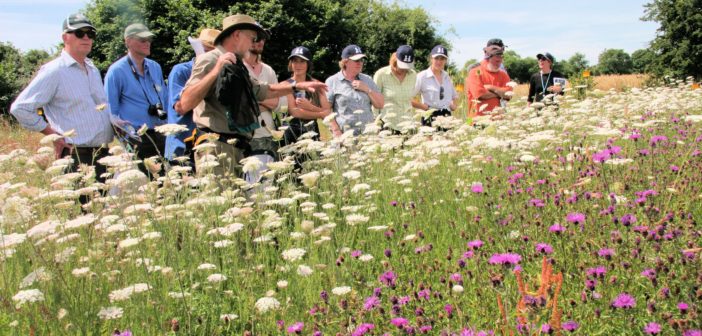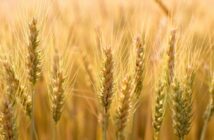Wildlife by design not accident must be the key priority in rising to the challenge of environmental improvement alongside profitable cropping believes farmed wildlife authority, Marek Nowakowski.
Speaking at the first-ever bee and flower event for growers and agronomists run by Agrii at a special farm trial site at Chesterton, near Bicester, he insisted that understanding which bees are important for pollinating which flowers and when is becoming essential for our farming future. Only then can we grow the right wildflower mixes most effectively to deliver the greatest season-long pollinator and overall wildlife gains.
“Fallow is as untargeted as you can get in environmental improvement and we have seen little or no wildlife delivery from 5% EFAs in most cases, ” he explained at the site where he and independent entomologist, Mike Edwards are recording pollinator activity in detail every three weeks across more than twenty 100m2 strips of different wildflowers.
“We know the right area of flowers on farms can have a massive insect benefit. So much so, that our industry should be able to achieve everything being asked of it in environmental improvement with just 2% of correctly-managed EFAs.
“Rather than wildlife by accident over time if we’re lucky, we need wildlife by design, reliably and rapidly,” stressed Marek. “The CEH-managed Hillesden Experiment has shown us that this can be achieved on a farm scale in commercial practice. And we also know from years of study that grower and agronomist understanding is the single most important ingredient for success.
“We’re seeing far greater enthusiasm for wildlife improvement throughout the farming industry these days. What’s more, in the 30 years or more I’ve been involved in encouraging habitat creation I’ve never had a farmer pull back from activities that have delivered the goods.
“The aim of the pollinator preference trials we’re undertaking and the environmental training events we’re running across Agrii’s extensive network of growers and agronomists is to harness this enthusiasm with recipes we know will succeed and further motivate.”
From their two years of work at John Deeley’s Simms Farm, Chesterton and previous long-term studies, Marek and Mike have accumulated a vast store of scientific data on the best pollinators to encourage and the best flower mixes to grow to encourage them. They are using this to develop increasingly better-targeted wild-flower mixtures accompanied by the best agronomic advice on growing them.
“Grow flowers get bees; it’s not rocket science,” said Marek. “But we also need to appreciate that the large number of different solitary and bumble bees we have in this country are as important in pollination as honey bees, if not more so. Add to this the fact that different pollinators depend on different types of flowers for their well-being, have different foraging ranges and need different nesting sites and the challenge of improvement is nowhere near as simple.
“Having said that, we know we can bring about remarkable increases in the pollinators that really matter if we get our habitat creation and management right. So we can achieve the benefits we want – and our politicians seem to be seeking – from much smaller areas.
“The more we learn and understand about the outputs we’re looking for the better – and more cost-effectively – we’ll be able to achieve them. Just like growing crops, it’s all in the agronomy.
“If we’re after the best bread wheat result we sow a Group 1 variety, give it enough nitrogen and make sure our spray programme is tip-top. We do this because we know what works and, equally importantly, what doesn’t.
“Our Agrii research and training programmes are bringing the same agronomic intelligence to bear on the more progressive approach to environmental improvement that I have no doubt will be an important imperative for our farming future in the post-Brexit world.”
Practical Pollinator Guidance
As well as a 90-page handbook on habitat creation and management for pollinators published with Richard Pywell of the Centre for Ecology & Hydrology, Marek Nowakowski has authored a series of Agrii Wildlife Information Sheets providing practical guidance on farmland pollinator improvement from the best available research.
Copies are available free-of-charge to farmers and land-owners through the Agrii customer services team on 0845 6073322 or www.agrii.co.uk




